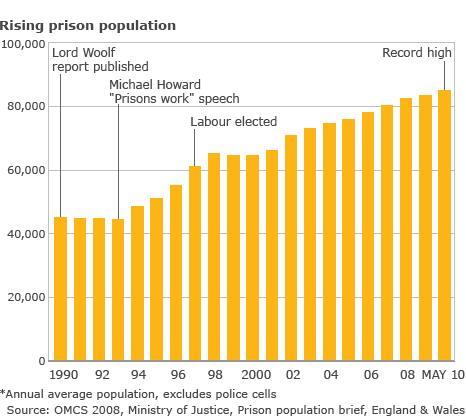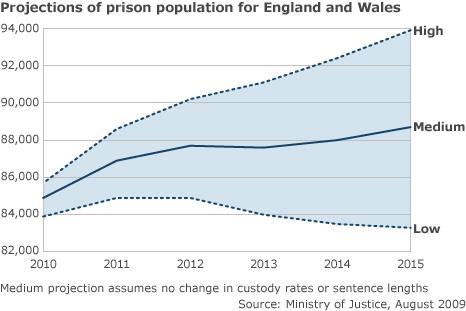Prison reform plans criticised by Michael Howard
- Published
Former Conservative Home Secretary Michael Howard has said he was "not convinced" by the government's plans to send fewer criminals to prison.
Justice Secretary Ken Clarke revealed plans for a radical reformation of the prison service with a new emphasis on community sentences and rehabilitation.
He said locking people up for the sake of it was a waste of public funds.
But Mr Howard told BBC Radio 4's PM programme that serious and persistent criminals needed to be jailed.
Mr Clarke unveiled the new measures during his first major speech since taking office.
Mr Clarke said prison had too often proved "a costly and ineffectual approach that fails to turn criminals into law-abiding citizens".
Speaking in London he said: "More than half of the crime in this country is committed by people who have been through the system. We must now take action and shut off this revolving door of crime and reoffending.
The plans will involve paying private firms and voluntary groups according to how many prisoners they rehabilitate.
Mr Clarke added: "We need a more constructive approach that tackles this head-on. An intelligent and transparent approach to sentencing that targets the causes of reoffending, so making our communities safer and better places to live.
"We describe it as a rehabilitation revolution."
Mr Howard, who was home secretary from 1993 to 1997, said he stood by his famous "prisons work" speech given to the 1993 Conservative Party conference.
Stressing that he was expressing his personal opinion, he said: "I've read [Mr Clarke's] speech.
"I'm not convinced by it.
"I think in order to protect the public, serious and persistent criminals need to be put in prison.
"I think that is what conscientious judges and magistrates are doing at present and I think that is the best way of protecting the public."

David Cameron defended the plans during prime minister's questions and said: "If ever there was part of our public services that needed radical reform to make sure prison does work, then now that's it."
In May the prison population in England and Wales reached a record high of 85,201.
That is almost twice the figure in 1992, when Mr Clarke was last in charge of prisons as home secretary.
It was an increase he said he would have dismissed as "impossible and ridiculous" if someone had predicted it at the time.
Earlier Mr Clarke told the BBC a sentencing review based on punishment and protecting the public was needed.
These reforms will hopefully pay for themselves by reducing the costs elsewhere within the criminal justice system, Mr Clarke added.
Tory backbencher Philip Davies said many Conservatives would feel "very disappointed" by the announcement as many supporters voted for the party on the basis that more people would be jailed rather than fewer.
Shadow home office minister David Hanson said Mr Clarke needed to back his ideas with a better prisons budget.
"Where Ken Clarke has a point is that there are people who go through the system who revolve through that door who have long-term drug, alcohol, employment problems - who need to be reformed to get back into society in a positive way," he said.
"But where I disagree with Mr Clarke is that it takes resources. And he is now planning to cut the resources to the justice department and to probation by 25% over the next four years."
Shadow justice secretary Jack Straw said the government was pursuing an ideology "that puts the offender above the victim" and was taking a "terrible risk with public safety".
The general secretary of the Prison Governors Association, Paddy Scriven, said jails had some "stunning successes" with inmates who spent more than six months behind bars.
"If we're left to concentrate on that and the shorter sentenced prisoners become the responsibility of a properly-funded probation service, then... we're cutting costs and looking after the public in the way that we should be," he said.
Change required
The Probation Chiefs Association said it supported Mr Clarke's plans and said the next step for the service should be a "flexible strategic framework free of overly bureaucratic control and interference".
Juliet Lyon, of the Prison Reform Trust, said the system needed change as it was not working.
"You only have to look at the reconviction rates for those short sentence people - over 60% reconvicted within a year of release - to realise that we've got very poor value for money," she said.
But author and former senior probation officer David Fraser said that the alternatives proposed were not new and the reconviction rates of people who were placed back in the community were worse than those who sent to prison.
He told the BBC the best deterrent would be a sentencing policy which ensured repeated offenders received a longer sentence every time they were convicted.
Reoffending rose by 8% for adults between 2006 and 2008, and nearly half of offenders sent to prison are reconvicted within a year.
Meanwhile, MSPs have passed proposals to vastly reduce the number of prison sentences of three months or less at the Scottish Parliament, despite opposition from Conservatives.
The measure, which will introduce a presumption against the shorter sentences by sheriffs, was voted through in the Criminal Justice and Licensing Bill by MSPs at Holyrood.

- Published30 June 2010
- Published28 June 2010